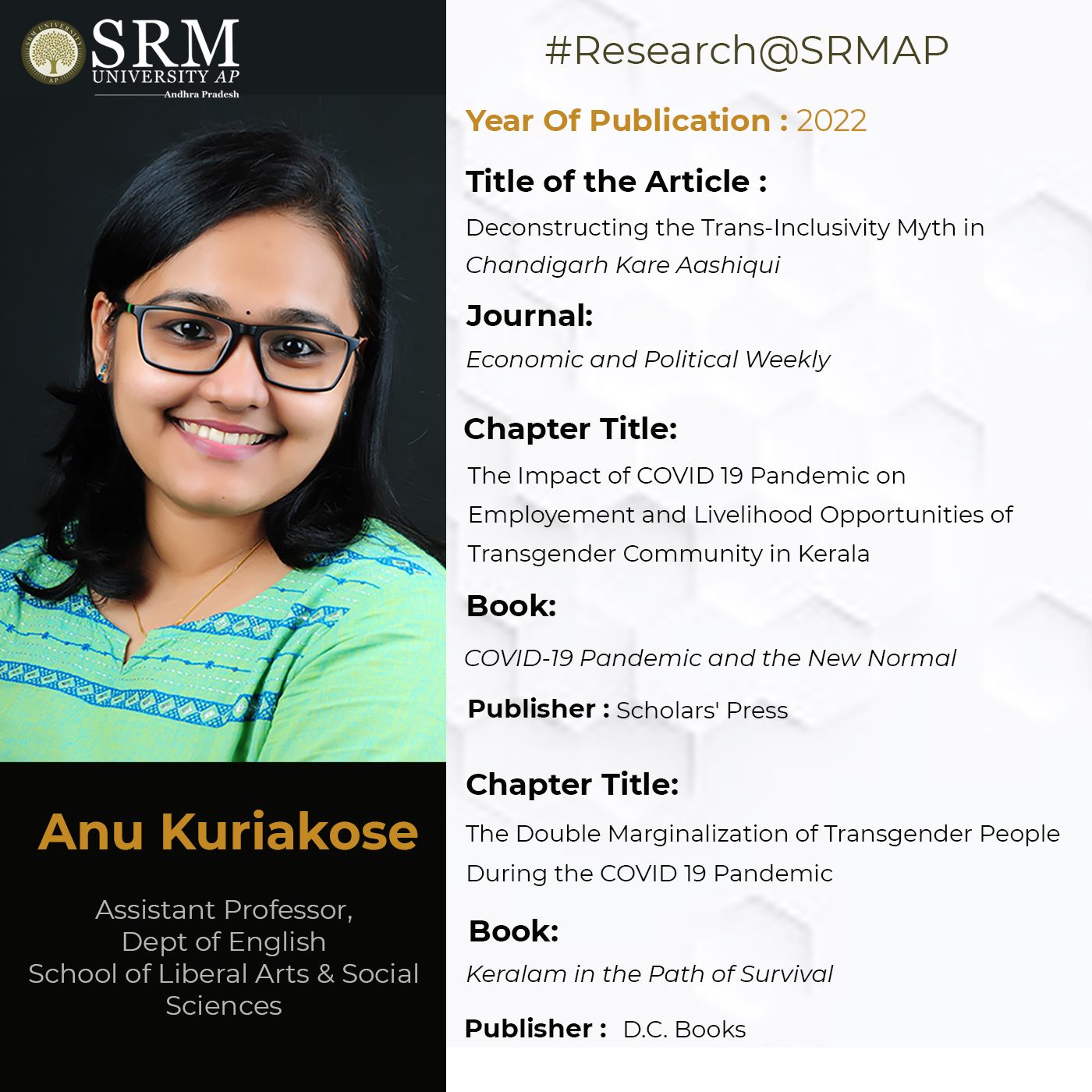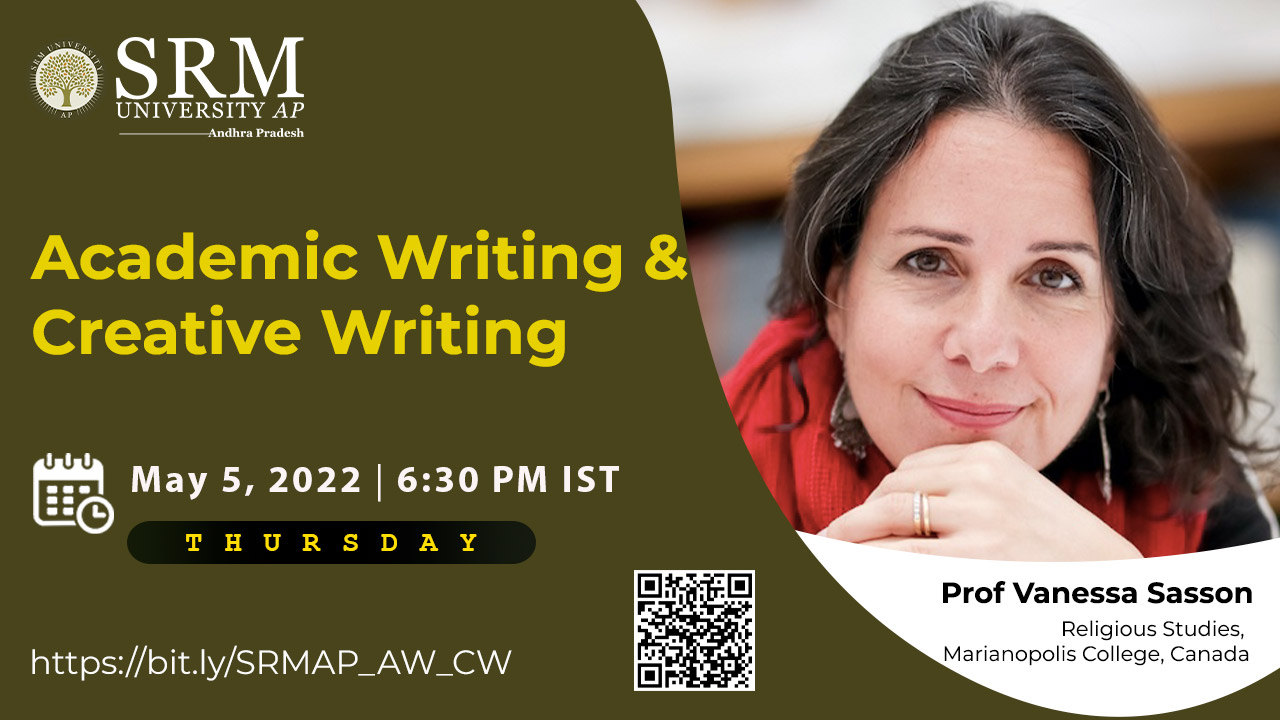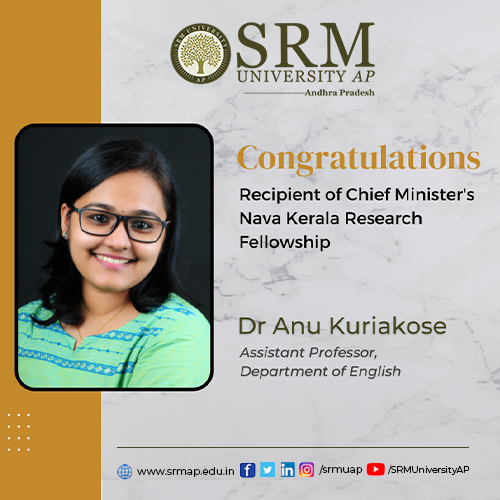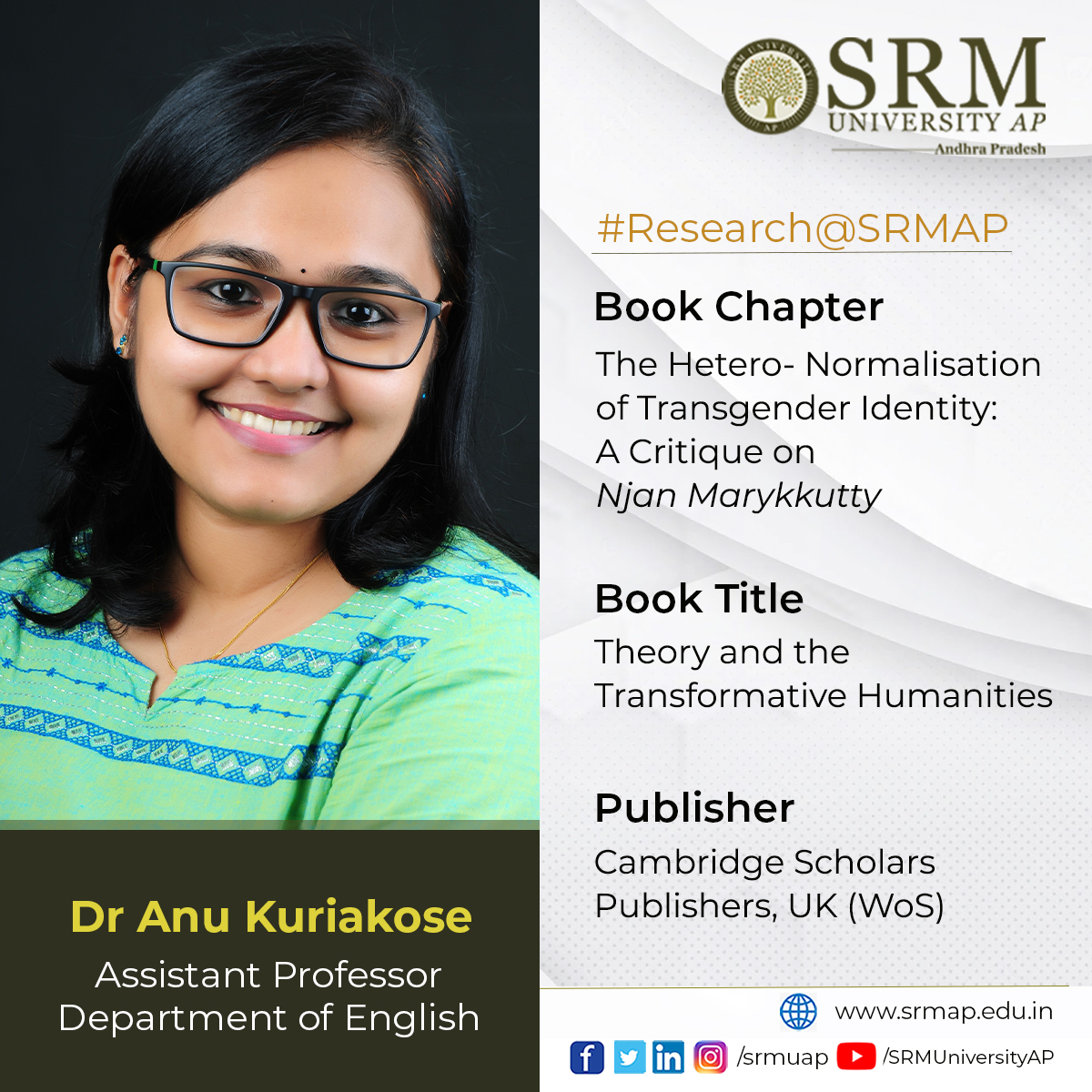Unwinding the transgender travails

Embracing one’s transgender identity is a tremendous act of courage in a world that refuses to acknowledge their very existence. The narrations of their trials and tribulations continue to prevail despite the measures taken by the state machinery to assert their rights or the transgender revolution that spilt over in recent times. So long as the society continues to deny them a conducive space to exert their existence, the transgender community will have to endure hardships in all walks of life. The present-day researchers have increasingly shifted their focus on the LGBTQIA+ community to unravel their survival tales and awaken the population to their basic human rights.
Dr Anu Kuriakose, Assistant Professor from the Department of English, has also been looking into transgender lives and the anomalies in their representation. Her research analyses the inclusion and representation of transgender people in Indian films with a specific focus on the shift in representational politics and inclusive strategies in films of late. She has recently published a paper titled “Deconstructing the Trans-Inclusivity Myth in Chandigarh Kare Aashiqui” in the Economic and Political Weekly.
The article offers a critical reading of the Hindi film Chandigarh Kare Aashiqui (2021), which appears to maintain an inclusive outlook towards the queer community. Through the article, Dr Anu draws attention to the glaring presence of transphobic and homophobic attributes even in such progressive films. Her research attempts to analyse whether there have been any significant shifts in trans representation and inclusion in contemporary cinema.
She has also published two chapters, “The Impact of COVID 19 Pandemic on Employment and Livelihood Opportunities of Transgender Community in Kerala” and “The Double Marginalization of Transgender People During the COVID 19 Pandemic”, in the books COVID-19 Pandemic and the New Normal and Keralam in the Path of Survival respectively. The works recount the unspoken sufferings underwent by the transgender community in Kerala during the pandemic times. The chapters were co-authored by her peer, Dr Vinshi P K.
Her upcoming research plans include addressing gender diversity and inclusion in academic discourses in the vernacular of Kerala and critically reviewing the representational politics of trans femininity in visual cultural texts. By researching the portrayals of transgender community, Dr Anu intends to enhance awareness on the deviant representation of queer community in the realms of literature.
- Published in Departmental News, English Current Happenings, English news, News, Research News
Know your style of writing

The art of writing can be branched out into different types depending upon the purpose of each piece of writing. You might have come across varied styles of writing such as creative writing, academic writing, technical writing and many more. Have you ever tried to deduce the difference between all these writing styles? Well, we offer you an informative session that will help you gather a better understanding of different styles of writing.
The Department of English has scheduled a webinar on the topic “Academic Writing & Creative Writing” under the theme “Language and Society” with Prof Vanessa Sasson as the keynote speaker.
Date: May 05, 2022
Time: 6.30 PM IST
Academic writing and creative writing seem to be pulling the act of writing and the writers in two different directions. A lot of writers, especially aspiring writers, tend to think of both genres as catering to very different audiences and fulfilling very different needs in very different contexts. Does that mean you can be only one and not the other? Do you have to choose? And how do you decide what to commit to? In this talk, Prof Vanessa Sasson will share her experience of writing in both capacities and discuss the joys and challenges of both.
About the Speaker
Vanessa R Sasson is a professor of Religious Studies in the Liberal Arts Department of Marianopolis College where she has been teaching since 1999. She is also a Research Fellow at the University of the Free State and a Research Member for CERIAS at UQAM. She has published widely as a scholar, with a number of academic books to her credit. Her most recent book was published by the University of Hawaii Press (2021) and is entitled, Jewels, Jewelry, and Other Shiny Things in the Buddhist Imaginary. Yasodhara and the Buddha (Bloomsbury, 2021) is her first novel. She is currently completing the sequel.
Join the Webinar to master the art of writing!
- Published in Departmental Events, English, English Current Happenings, Events
Dr Anu Kuriakose bestowed with CM’s Nava Kerala Research Fellowship

The Government of Kerala has chosen Dr Anu Kuriakose from the Department of English for the prestigious Chief Minister’s Nava Kerala Research Fellowship in the stream of Political Science, Historical Studies, Humanities & Liberal Arts. The award has been designed by Kerala Government to further the state’s development plans by promoting research across various disciplines. Dr Anu obtained the grant for her intriguing study in the domain of gender studies. She intends to look at the digital turn in the genderqueer movements in Kerala with a cross-cultural perspective from any specific locale in Europe.
There have been many research studies involving the examination of queer and trans representation in media. With the turn of the century, we witnessed a remarkable shift in the digital representation of the queer community.
Through her research “Dissenting Heteronormativity and Mainstreaming Identity: A Critical Assessment of the Digital Turn in GenderQueer Movements in Kerala”, Dr Anu is fixated on uncovering the digital collectives in which Malayali genderqueer people are also a part of and the digital turn in the genderqueer movement in Kerala, of late.
She expressed her delight over receiving this opportunity that could help her make substantial contributions to the state’s progress. “I feel proud and humbled for getting this title; my project aims to map the genderqueer movements, the digitally networked associations of which Malayali gender non-conforming people are part, and the nuances of their digital turn at present”, she said.
The Department of English, University of Calicut, has agreed to be a hosting centre for the research project. The GEXcel International Collegium for Advanced Transdisciplinary Gender Studies, Karlstad University Sweden, has also agreed to collaborate. She also wishes to make SRM University-AP a stakeholder in the same.
“I am hugely motivated by the weight SRM University-AP gives to research. From making collaborations to publishing papers in reputed journals and receiving grants from external bodies, the university has anchored as an encouraging platform to stimulate the research pursuits of its faculty and students”, she maintained. “I am truly indebted to my peers and everyone here for providing a conducive environment to fructify my research interests”, remarked Dr Anu.
- Published in Departmental News, English Current Happenings, English news, Faculty Achievements, News, Research News
Decoding the problematic narratives in mainstream Queer cinema
 The trajectory of trans representation in cinema is essentially critical since the predominant viewers belong to the heteronormative cisgender public. Visual media played a massive role in inculcating the idea of gender identity into the preconditioned entity of heteronormativity. The skill and sympathy of the filmmaker in handling trans issues hold a significant chunk of this representational politics.
The trajectory of trans representation in cinema is essentially critical since the predominant viewers belong to the heteronormative cisgender public. Visual media played a massive role in inculcating the idea of gender identity into the preconditioned entity of heteronormativity. The skill and sympathy of the filmmaker in handling trans issues hold a significant chunk of this representational politics.
The popular media in Kerala has reconfigured its space to include people with gender non-conforming identities and sexual orientation as a matter of concern in contemporary times. However, there are times when the filmmakers fail to understand the assignment. The new research chapter of Assistant Professor Dr Anu Kuriakose, Department of English, articulates the discomfort of seeing the misrepresentation of transgender identity in mainstream cinema. The chapter titled The Hetero- Normalisation of Transgender Identity: A Critique on Njan Marykkutty was published by Cambridge Scholars Publishers, UK (WoS) and belongs to the book Theory and the Transformative Humanities.
Problems that face the humanities discipline today have sparked an intense debate across the globe. The Theory of the transformative humanities envisions a domain of inquiry that attempts to transform cultures, individuals, and society. This volume explores different theoretical perspectives and practical orientations through which to perceive, innovate and transform the world in which we live. It opens diverse fields of thinking and research. It offers a broader perspective on how a critical-literary approach could be deployed in addressing the multidimensional and evolutionary nature of the humanities in a way that caters to the needs of the present. A compilation of scholarly essays on topics as diverse as post-millennial theory, trans-humanities, posthumanism, interdisciplinarity, psychoanalysis, and film studies, the book provides an enabling platform for intellectuals, research scholars, and experts in the humanities to tap into the transformative potential of the field.
This chapter critically examines the representational politics of the central transgender character Marykkutty in the 2018 Malayalam film Njan Marykutty. The release of this film marked an unprecedented debate on transgender identity in Kerala’s public sphere, more specifically, about transwomen’s visibility in the public sphere. This is quite significant, as it has been a moment of the culmination of various activist, academic, and governmental interventions in the state attempt to mainstream the trans identity from the margins of society. She has used visual and thematic analysis as a method to critically look at the visualization of a trans feminine body in this film. The chapter analyses the trans identity in terms of Judith Butler’s theory of gender performativity, Julia Kristeva’s ‘abject,’ and Jacques Lacan’s notion of ‘object petit a’ or object of desire. It is argued that the excess in normalisation of the transgender body ironically endorses the heterosexual values of the binary gender performance when the surgically re-appropriated body is celebrated, clapped on the big screen, and sensationalised as an achievement when the central character themselves voices, “I am not a transgender, I am a transsexual.”
Heteronormativity safeguards the normalisation of heterosexuality through myriad practices so as to concrete the notion of a legitimate form of sexuality. Dr Anu Kuriakose attempts to denaturalise and denormalise the excessive lauding of heterosexuality in cinema to open up a less distorted corridor to queer desires and identity.
- Published in Departmental News, English Current Happenings, English news, News, Research News
- 1
- 2

